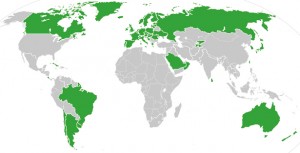Utilitarian calculations guide public health as a rational effort to maximize the net wellbeing of the population. Utilitarian measures promise effectiveness, action, and widespread applicability. However, in our society, even the most promising or rational utilitarian measures will be blasted as soon as it endangers the core American value of individual liberty.
The Model State Emergency Health Powers Act (MSEHPA) for example, was blasted as an attack on individual freedoms by many critics. MSEHPA was a proposal meant to help state governments reform outdated and inadequate public health policies and infrastructure after 2001. It proposed giving states the legal right to ignore certain individual liberties in emergency situations in the interest of public safety. This included permitting public health authorities to physically examine, test, vaccinate, treat, and quarantine individuals as necessary “to prevent or limit the transmission of a contagious disease.” Additionally, authorities would have the right to destroy any facilities or property that posed a public health threat due to contamination.
Lawrence Gostin, a leading author of the MSEHPA proposal, responded by stating that “in a country so tied to rights rhetoric on both sides of the political spectrum, any proposal that has the appearance of strengthening governmental authority was bound to travel in tumultuous political waters.”
The MSEHPA does propose a breech of personal liberties, and these powers are supposed to be reserved for emergency situations only. But there’s still no denying that it is a part of a post-9/11 reaction that has gained security at the cost of individual freedoms. The consequences of this reaction are only beginning to resurface as we examine the NSA’s abuse of the Patriot Act. Americans have witnessed how easily power can be abused by the bureaucrats we have entrusted.
Governmental mandates and heightened legal power will always come with a backlash. What does this mean for public health, and vaccinations in particular? That a mandatory vaccination policy would be extremely controversial – even to those who believe that it’s the right thing to do. Forget vaccinations. We could be talking about some magical miracle potion here. The fact remains that there’s something justly frightening to the American people about giving the government the power to inject substances into anyone and everyone. As someone who generally agrees that all adults and children should be vaccinated, I believe this direct conflict between utilitarian aims and individual liberty means that we have a duty to raise awareness and incentivize vaccinations without resorting to government mandates.
References
Gostin, L.O. “Public Health Law in an Age of Terrorism: Rethinking Individual Rights and Common Goods.” Arguing About Bioethics. London: Routledge, 2012. 374-384. Print.
Gostin, Lawrence O. “Model State Emergency Health Powers Act: Public Health and Civil Liberties in a Time of Terrorism, The.” Health Matrix 13 (2003): 3.

